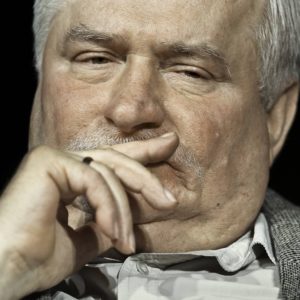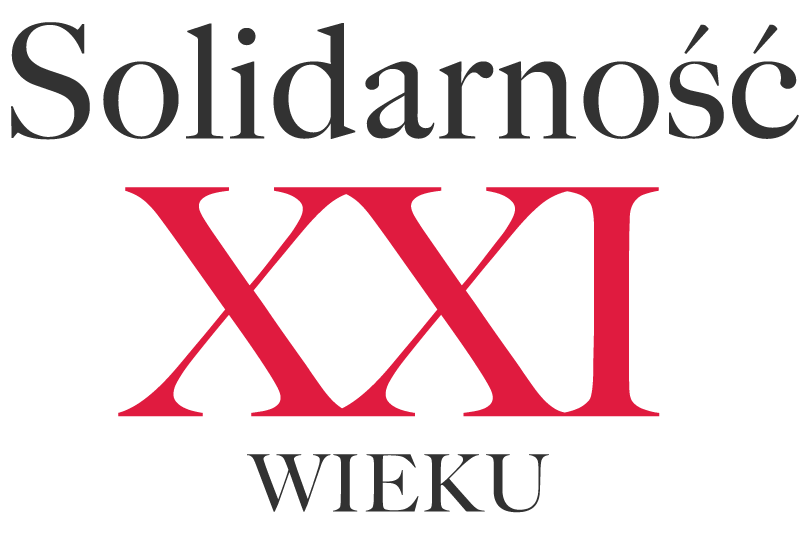
Lech Wałęsa was born on September 29, 1943 in Popowo, a Pomeranian village that was back then occupied by the Third Reich. Raised by his mother and uncle – his father Bolesław Wałęsa was murdered by the Germans during the war. He has a vocational education as an electrician, his early career was mainly in the Lenin shipyard in Gdansk.
The first mentions related to his opposition activity date back to 1968, when he urged his colleagues in the shipyard to refuse participation in the artificial demonstrations condemning the strikes of students. Since then, he has become more actively involved in social affairs. During the strike in December 1970, he actively participated in the work of the Strike Committee, and there was even a proposal that he become its president.
After the tragic incidents and massacre of the protesters, he swore that this situation could never happen again. He joined the work of Free Trade Unions with full commitment. He organized shipyard workers, distributed leaflets, and organized meetings on labor rights and self-education with other activists.
A breakthrough in the fate of Poland, and also in the life of Lech Wałęsa, took place in 1980. The failure of Edward Gierek’s modernization plan, which led to a spiral of debt and a decline in living standards, as well as an increasingly reactive government policy, caused dissatisfaction, followed by protests, including at the Lenin Shipyard in Gdańsk. Wałęsa, then unemployed after being fired from work for “subversive activities,” returned illegally to the shipyard, jumping over her fence to lead the strike. After two weeks of strikes that had spread throughout Poland, Lech Wałęsa, as chairman of the Inter-Enterprise Strike Committee, signed the August Agreements with the communist government, which ended the nationwide strike and gave the Poles the right to organize trade unions. Then the famous words were spoken then from the gate of the shipyard: “We have independent, self-governing trade unions!”
After signing the agreements, Wałęsa returned to work at the shipyard. Shortly after, he was elected the first chairman of the “Solidarity” Independent Self-Governing Trade Union. During the first year of its existence, “Solidarity” evolved into a nationwide socio-political movement of 10 million Poles, or more than a quarter of the country’s population, seeking a fundamental change in the realities of the political and economic system in Poland towards greater freedom, representativeness and accountability of the authorities to the people.
The Carnival of “Solidarity” ended on December 13, 1981, when the government, led by General Wojciech Jaruzelski, introduced martial law in Poland, arresting and interning all Solidarity leaders and brutally, sometimes with bloodshed, breaking up the reborn Polish civil society. Lech Wałęsa was sent to the internment camp in Arłamów. The authorities wanted to use him as a signboard of the new “Solidarity” under the control of the Security Service, but he refused to talk to them. He was released on November 14, 1982.
Since then, despite returning to work in the shipyard, he was under constant surveillance of secret services while Poland, held in an iron grip on the army, entered the “wasted decade”. On October 5, 1983, Lech Wałęsa, who had remained in the shadows since his release from prison, reconstructing the broken structures of the opposition, returned to the headlines all around the world. On that day, the Nobel Committee announced its decision to award him the Nobel Peace Prize for his leadership role in the rise and temporary success of “Solidarity”. The committee justified its decision as follows:
The Committee recognizes Wałęsa as an expression of longing for freedom and peace, which – despite unequal conditions – exists invincible in all nations of the world. At a time when relaxation and peaceful conflict resolution are more needed than ever before, Walesa’s effort is both an inspiration and exemplary.
The award was collected on his behalf by his wife Danuta and son Bogdan, while Lech Walesa remained in Poland for fear of refusal of return to the country by the communist authorities.
Meanwhile, the faulty economic system of the Polish People’s Republic and the sphere of influence of the Soviet Union, bursting at the seams, both began to fall apart. The end of the communist dictatorship in Poland, delayed at a great cost in 1981, inevitably hung over the Polish United Worker’s Party authorities in the late eighties. The Polish People’s Republic economy, which had been in agony for over a decade, once again led people to the streets. The outbreak of the strike at the Gdańsk Shipyard in 1988, as well as social unrest in the whole country gave the opposition, smashed a decade earlier, a chance to fight for the political de‑monopolization of the system and salvation of Poland from an economic catastrophe.
As a result of agreements between the opposition, the Church and the authorities, the Round Table deliberations began in 1989. Under the leadership of Lech Wałęsa, the opposition’s delegation negotiated a de‑monopolization of the political system of the PPR through the participation of the opposition in partially free elections. The so-called June elections, which took place on June 4, 1989, proved to be a total victory for the opposition led by Walesa, who became an undisputed symbol of the Polish struggle for freedom. By winning all contested seats in the Sejm and 99 out of 100 in the restored Senate, the opposition deprived the authorities of all legitimacy, forcing the PUWP to hand over the position of the Prime Minister to the “Solidarity”. With the support of Lech Wałęsa, Tadeusz Mazowiecki became the first non-communist prime minister in the Eastern Bloc – thus Solidarity initiated the so-called “Autumn of Nations”, which within two years led to the collapse of the Warsaw Pact, the fall of communism in Europe, full democratization of Europe and the collapse of the Soviet Union.
In 1989, Lech Walesa, as the third private person in history, spoke to the Joint Session of the US Congress. “We the People” – the words with which he began his speech won the hearts of the American authorities and provided liberated Poland with Washington’s support in the difficult task of political and economic transformation.
Meanwhile, in Poland, Lech Wałęsa, as the leader of the movement who managed to peacefully overthrow communism in Poland, became the obvious opposition candidate for the presidency of the Republic of Poland after the resignation from office of Wojciech Jaruzelski, previously elected by the PUWP-controlled Sejm. In the first free presidential election in the newborn Third Republic of Poland, Lech Walesa won, gaining the largest democratic mandate in the history of Poland thus becoming the first democratically elected president of the Republic of Poland in post-war times. In 1990, he received from the hands of Ryszard Kaczorowski, the last president of the Second Polish Republic in exile, the presidential insignia salvaged from Poland in September 1939, ensuring the continuation of Polish statehood with pre-war the tradition.
After Lech Wałęsa took the office of president, the power in Poland was entirely in the hands of the opposition. Not everyone believed that the new rulers would manage to lead Poland out of the tragic situation in which it found itself after 40 years of dictatorship and foreign occupation. Mieczysław Rakowski, the last First Secretary of the Central Committee of the Polish United Workers’ Party, in his book “How it happened”, describing the fall of the communism in the eighties, wrote that soon someone else would probably write a book with a similar title. There was a pessimistic joke in Washington that there were two solutions to the Polish crisis: optimistic and realistic. The realistic being that angels will descend from heavens and start giving away gold. Optimistic presumed that the Poles will solve their problems themselves.
Despite this, during the presidency of Lech Walesa, the economic transformation plan implemented by Leszek Balcerowicz led to the rebound of the Polish economy from the bottom and rapid economic growth after initial difficulties. Meanwhile, Lech Wałęsa was conducting a diplomatic offensive in Washington and other Western capitals to open to Poland and other Central European countries a path to NATO and the European Union. After talks in Warsaw, President Walesa managed to convince Boris Yeltsin to express his conviction that Russia would not oppose Poland’s membership in NATO, depriving the most important argument from the critics of the admission of former communist countries to the Western community. During the presidency of Walesa, the last Russian troops also left Poland, and Warsaw recognized the newly-independent countries of Eastern Europe that had separated from the Soviet Union – Ukraine, Belarus, Lithuania, Latvia and Estonia.
The presidency of Lech Walesa took place in a breakthrough period for Poland, Europe and the world. Its achievements laid solid foundations for Poland’s economic success, which made Poland the fastest growing country in the OECD developed countries zone in the last thirty years, as well as Poland’s membership in NATO and the European Union.
Lech Wałęsa ceased to be president after losing the election to Aleksander Kwasniewski in 1995. Since then, he has been involved in non-governmental and charitable activities, runs the Lech Walesa Institute, modeled on the US presidential foundations, and occasionally comments on the political situation. Still close to his heart is the idea of ”Solidarity”, which, as he believes, has a large role to play not only as a symbol of struggle and success from the past, but also can help prepare us for the challenges of the 21st century. Therefore, the time spent in political retirement he decided to devote to the fight to preserve the heritage of “Solidarity” and make it a slogan of a better future.
